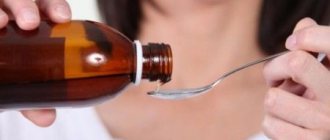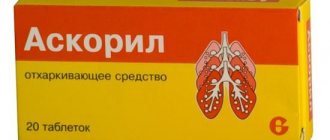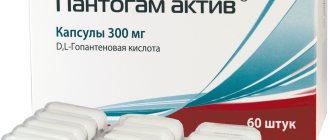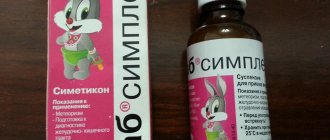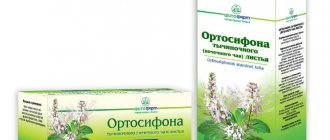Use of Gerbion for dry cough during pregnancy
The most common cause of a dry or wet cough when carrying a baby is the development of respiratory pathologies.
Namely:
- Rhinitis;
- Bronchitis;
- Laryngitis;
- Sinusitis;
- Pharyngitis;
- Tracheitis.
An allergic reaction can also provoke the development of a cough. For example, such a reaction can be caused by lingonberry leaves used as a decoction. Not often, a cough can develop due to stress, problems with the gastrointestinal tract or diaphragm, thyroid gland, heart, blood vessels or hearing organs. Cough is dangerous for a pregnant woman.
When coughing, the abdominal muscles tense, and this leads to an increase in uterine tone.
The more a pregnant woman coughs, the more often the uterus becomes toned, which can result in a miscarriage. Another possible negative consequence of coughing is the development of oxygen deficiency in the fetus, which, again, occurs due to increased contraction of the uterus. A dry cough often provokes the development of hypertension, and with prolonged attacks and lack of therapy, it can cause placental abruption or bleeding.
Attention! It is important to understand that a cough is a symptom of a cold. In order to prevent the development of a dangerous pathology and complications, a woman carrying a child must be cured and eliminate a dry or wet cough. Many pharmaceutical medications are contraindicated when carrying a child. Of the medications that are approved for use, doctors often prescribe the herbal preparation Gerbion, which comes in two varieties, for dry and wet coughs.
What does Papaverine help with during pregnancy: 3 release forms
How dangerous (and is it dangerous?) is the drug for pregnant women?
Contraindications
The drug Gerbion contains only natural ingredients, but nevertheless, pregnancy and lactation are among the contraindications to the use of the drug.
Contraindications for use are associated with the lack of data on the behavior of the body during pregnancy, as well as on what percentage of the drug passes through the placenta to the baby.
Other contraindications include:
diabetes mellitus of any type; age of children under 2 years; history of acute obstructive laryngitis; intolerance to components, including auxiliary ones; asthma, including acquired; sucrose-maltose deficiency from birth; fructose intolerance.
When taking the drug for any of the contraindications, it may cause severe side effects and lead to serious health problems.
Side effects
Despite the herbal nature of the drug, if the dosage is incorrectly prescribed or if there are contraindications, side effects are possible . These include:
- frequent uncontrollable cough; skin rashes of non-allergic nature; increased sweating and fatigue; tachycardia or vice versa slow heartbeat; severe vomiting and nausea; upset stomach, in rare cases bloody diarrhea; shortness of breath when walking at a calm pace; feeling of itching all over the body; headache combined with other symptoms; swelling of the face and limbs; bloating and chest discomfort; manifestation of previously registered allergic reactions; rosacea
Herbion during pregnancy: 1st trimester
During the first trimester, all organs of the baby are formed, and that is why the use of any medications is contraindicated. However, it is absolutely impossible not to treat a cold at all, since the symptoms of the pathology can cause pregnancy to be terminated. If a pregnant woman needs to cure a dry cough, then Herbion with plantain can be used in the first trimester. In case of a wet cough, as the instructions say, it is better for a woman to refuse the herbal preparation with primrose and use therapy using alternative medicine methods. It is important to consult a doctor before this, he will give recommendations.
For example, to eliminate cold symptoms, doctors advise:
- Drink more fluids;
- Maintain bed rest;
- For fever, drink tea with raspberries;
- Warm milk and butter or hard candies will soothe your throat;
- Inhalations and rinsing with decoctions will bring benefits.
Herbion syrups with plantain and primrose are herbal, effective, safe cough preparations that have earned an excellent reputation among many doctors and patients. However, women carrying a baby should use syrup only after consulting a competent doctor.
Advantages and disadvantages of the drug
Pregnant women, when turning to doctors because of a cough, often hear that they are prescribed syrups. And all this because they have a lot of positive aspects:
The pharmacological form of the medication is quite convenient: for many it is more convenient to drink syrup than tablets.
Despite all the positive aspects, this drug has not been fully studied by specialists. In particular, this concerns various side effects, about which nothing is known yet. When taking the drug for pregnant women, it is important to be extremely careful and not neglect all the doctor’s advice.
Regarding the reviews of those women who took the syrup in the 2nd trimester and later, it should be noted that the majority of them are good.
As a conclusion, we can say that Gerbion syrup of two types is a natural, safe and very effective remedy for cough during pregnancy. The medicine has been recognized by many doctors and specialists, after which they recommend using it in treatment already in the 2nd and 3rd trimester.
Gerbion syrup: reviews
Gerbion syrup received the most positive reviews from both doctors and patients. The extracts of plantain grass, primrose mallow and ascorbic acid included in the composition are used for colds. The mucus included in the composition envelops and protects against irritants that cause coughing.
Plantain herb penetrates inside, irritates mucosal receptors and stimulates the secretion of bronchial glands, reducing the viscosity of sputum and increasing its quantity.
Syrups have bacteria-eliminating properties. The use of the drug makes it possible to suppress the cough reflex.
The presence of ascorbic acid in the composition of the medicine explains the property:
- Strengthen vascular walls;
- Reduce body intoxication;
- Increases nonspecific immunity.
Reviews confirm that the syrup relieves and softens non-productive cough. Primrose syrup is used to improve expectoration. Saponins included in the composition facilitate the process of mucus separation and facilitate coughing. Thyme has a diuretic effect, relieves pain and spasms. The syrup also has an antihelminthic effect. The drug owes its expectorant and bronchodilator effects to thymol. Menthol increases the effects of thymol and also has antiseptic and anti-inflammatory properties.
Dosage and duration of use
Before prescribing Gerbion, the attending physician should order general tests and consult with a gynecologist to identify the general picture of the pregnant woman’s health condition.
If there are no obvious contraindications for use, the drug is prescribed in the following dosages :
- at the beginning of pregnancy and with a mild cough, it is taken in rare cases; it is allowed to prescribe the drug in a dosage of 2.5 ml of Gerbion twice a day for 5 days;
In the second trimester and with moderate cough, 2.5 ml of syrup is prescribed twice a day, sometimes the dosage can be increased to three doses;
in the last months of pregnancy, the maximum dosage of the drug is 5 ml twice a day, if the disease is mild, the usual dosage is sufficient, as in the second trimester.
Regardless of the complexity of the disease, you should carefully consider the dosage of Gerbion. The course of treatment cannot last more than one week.
The maximum permissible period for taking Gerbion is 10 days , after which it is worth completely stopping the medications or finding more effective ones.
Doctor Komarovsky's opinion
The famous doctor believes that it is necessary to take drugs to eliminate cough only if we are talking about a serious illness (whooping cough, pneumonia). The doctor claims that cough can be treated by eliminating the cause.
In 90% of cases, the cause of discomfort is a sore throat or too dry air in the room.
Among modern medications recommended for diseases of the lower respiratory tract, doctors highlight Gerbion for dry cough - the instructions for use assure that the medicine based on plantain leaves helps to cope with an irritating cough at any stage. Is this remedy effective and how to use it correctly? Can the drug be given to children?
Contraindications
Gerbion dry cough syrup has a number of contraindications; you must ensure that they are absent before starting to take the drug. The medicine should not be used in the following cases:
- allergic reactions, individual intolerance to the components of the drug;
- diabetes;
- individual congenital fructose intolerance;
- various disorders of glucose absorption, congenital sucrase deficiency;
- children up to two years of age.
In all other cases, the use of the drug is acceptable. However, in any case, it is recommended to start taking it exclusively under the supervision of a doctor.
No cases of overdose with Gerbion syrup have been identified. Side effects include allergic reactions; if they are intense, it is not recommended to continue using the drug. It is advisable to immediately consult a specialist.
Also, you should not take Gerbion simultaneously with cough suppressants and drugs that interfere with the formation of sputum. In this case, they will suppress the effect of the syrup and interfere with the treatment of colds or bronchitis.
Analogs
In addition to Herbion, there are several effective remedies for dry cough with similar effects. Most of them can be taken by children in the treatment of bronchitis and other respiratory tract diseases:
- Bronchipret. This drug is effective against most inflammatory diseases of the bronchi; it helps to quickly cope with a dry cough and its consequences in a fairly short course of treatment.
- Mukaltin. This drug is extremely useful for dry coughs; it provides rapid expectoration and release of sputum in diseases of the respiratory tract. It is effective against pneumonia and bronchitis.
- Pectoral. This cough syrup is most effective for infectious diseases of the respiratory tract, promotes the rapid removal of sputum, and helps to quickly go through the stage of a dry cough.
Before taking each drug, you should read the instructions for use. When using any of the drugs for dry cough, do not forget about the main treatment; syrups are suitable only as concomitant therapy.
Gerbion for dry cough: reviews from mothers
Anna P., 35 years old
The child was diagnosed with bronchitis, which developed from a simple cold. There was a constant dry cough, the doctor prescribed Herbion based on plantain. After a two-week course of treatment, frequent coughing attacks stopped bothering me, and the child began to recover.
Galina R., 38 years old
My youngest daughter’s cold started with a strong dry cough; in addition to many other medications, the doctor at the clinic prescribed Gerbion, which helps with severe attacks. Within a week after starting treatment, the condition improved, the daughter stopped coughing a lot, and there was no hint of side effects, although the child is allergic.
We will be glad if you leave your feedback on the use of Gerbion for dry cough for your children. How effective was the drug, how quickly did the child recover?
Thanks to its unique composition, the syrup effectively copes with dry cough in a short time. The advantage of the drug is its high efficiency and the possibility of use for children and adults.
Trade name: Herbion ® plantain syrup
Manufacturer: KRKA, Slovenia
Official website: gerbion.com.ru
To begin adequate treatment, you must consult with your doctor.
Indications
Products in the Gerbion line belong to the group of herbal medicines and are intended for the treatment of the following diseases and conditions:
- respiratory infections of the upper respiratory tract;
- inflammatory processes in the nasopharynx;
- flu;
- "nervous" cough.
It is important not to make decisions about taking the drug on your own, but to consult a doctor. He will prescribe or prohibit the use of the medicine, taking into account physiological characteristics, concomitant pathologies and age.
